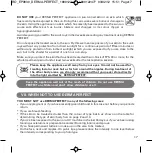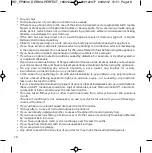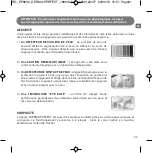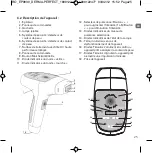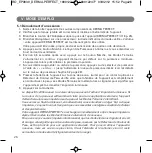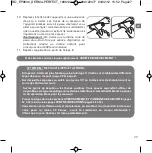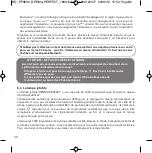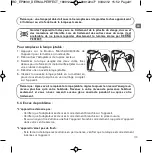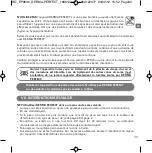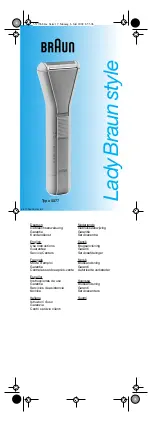
18
•
On your hair.
•
On the same part of your skin more than once a week.
•
If there is any abnormality to the area of the skin to be treated: red or pigmented birth marks,
brown or black spots on the skin like freckles or beauty spots. If you are using a make-up type
white pencil (which does not contain metallic by-products), white non-transparent sticking
plasters, or bandages to cover them up.
•
If the skin has become dried out or made fragile as result of chemical, glycolic or Alpha
Hydroxy Acid induced peeling.
•
Close to a body piercing: as a rule remove any body piercing before using the appliance.
•
If you have eczema, psoriasis, lesions which are healing or an infection which is developing
in the area to be treated. You must wait for the area affected to heal before using the appliance.
•
If you have abnormal skin pigmentation (vitiligo or albinism for example)
•
If you have an abnormal skin condition caused by diabetes, for example, or by other systemic
or metabolic diseases.
•
If you have a previous history of herpes rashes on the area to be treated, unless you have seen
your doctor about this and have received preventative treatment before using the appliance.
•
On any area containing any silicone implants, a pace maker, any implant for urinary
incontinence, an insulin pump or any metal implant.
•
In the case of any pathology to do with photosensitivity (e.g.: porphyria, any polymorphous
rash as a result of being exposed to light, sun urticaria, lupus…) or caused by any medicine
taken over the last 3 months.
•
If you’ve had medical treatment in respect of acne or other skin diseases such as oral isotretinoin
(Roaccutane
®
); medicines made from topical retinoids such as Tretinoin (rétinA
®
) ; vitamin A,
carotenoid or beta carotene over the last two months .
•
If you’ve taken Minocycline or other medicines made from tetracycline over the previous
month.
This list of medicines is not exhaustive, so ask your doctor for advice if you are following a
course of treatment.
•
If you’ve been on a steroid based diet over the last 3 months.
•
14 days after a course of microdermabrasion treatment.
•
If you are already undergoing other courses of treatment for reducing body hair.
•
If you have a previous history of skin cancer or if other areas of your body have been affected
by malignant skin tumours.
•
If you have undergone radio or chemotherapy over the last 3 months.
•
If you have had treatment with immunosuppressive drugs.
•
If you are prone to epilepsy.
•
Any other case which in the view of your doctor may make the treatment dangerous.
RO_EP9830_DERMA-PERFECT_1800122477_1800122477 03/02/12 15:51 Page18














